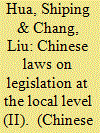|
|
|
Sort Order |
|
|
|
Items / Page
|
|
|
|
|
|
|
| Srl | Item |
| 1 |
ID:
109387


|
|
|
|
|
| Publication |
2011.
|
| Summary/Abstract |
In this issue of Chinese Law and Government and the previous (July-August 2011, vol. 44, no. 4) we include important laws on legislation on the national level, as with the previous issue, and the local levels, as with this issue. We have also included important background information related to the explanation of these laws. It is important to publish these two issues at this moment, as the Chinese government announced in 1997 that by the year 2010, China should have formed a comprehensive socialist legal system with Chinese characteristics. To be as truthful as possible in sketching this picture, we have decided to include original documents, that is, laws and the explanation of the making of these laws by the legislators, not analytical articles.
|
|
|
|
|
|
|
|
|
|
|
|
|
|
|
|
| 2 |
ID:
172184


|
|
|
|
|
| Summary/Abstract |
While evidence has suggested that international assistance projects become the targets of violence, political science research has often addressed this relationship at the state level and not the aid location itself. Given the heterogeneous nature of aid distribution and terrorist behavior within a state, it is important to study this relationship using higher resolution data. Using geocoded terrorist attack and multilateral aid distribution data, coupled with the PRIO-GRID cell structure, our approach sheds light on whether areas in which aid is distributed are more likely to be targeted by terrorist groups. Our results show that areas where aid is being distributed are targeted more heavily than areas without aid distribution. The modality of specific multilateral aid projects is also shown to impact whether they are more likely to be targeted. Further, we show that terrorists select different types of targets in aid locations than they do in non-aid locations, lending support to the notion that terrorists seek to intimidate local populations from collaboration with the government and to dissuade further government efforts. The results not only highlight and expand upon the dangers associated with aid distribution, but also the notion that aid content is a factor in terrorist targeting preferences.
|
|
|
|
|
|
|
|
|
|
|
|
|
|
|
|
| 3 |
ID:
139234


|
|
|
|
|
| Summary/Abstract |
The trajectory of the liberal peacebuilding project has encountered a fundamental critique of its failure to deliver the expected sustainable peace. This paper questions the approach with which it has been, and largely still is, pursued. We reflect on a more communicative, nuanced, contextual and time-bound approach. In particular, we identify the failure of the liberal peace to localise peace and to make it a part of everyday life in Cambodia. Nevertheless, we claim that liberal peace has unintentionally created space for progress, while a ‘local turn’ has proved significant. We demonstrate empirically that certain forms of local and everyday peace have emerged for the ‘wrong’ reason, and may evolve further. Hence, a local peace has gradually sunk in, although its liberal foundations remain virtual.
|
|
|
|
|
|
|
|
|
|
|
|
|
|
|
|
| 4 |
ID:
148479


|
|
|
|
|
| Summary/Abstract |
This study explores the local effects of internal armed conflict on postwar violent crime in Northern Ireland. It argues that exposure to wartime violence will lead to higher levels of violent crime in the aftermath of conflict. Particularly, it claims that exposure to violence committed by armed groups challenging the state (anti-government groups) will have this effect, as it erodes the legitimacy needed for local law enforcement agencies to function effectively. This, in turn, is expected to contribute to the emergence of a postwar public security gap that lowers opportunity costs to resort to violent crime for a range of local actors. To evaluate these propositions, spatial statistics on a subnational dataset covering war-related fatalities for the period 1969–98 and police crime records for the postwar period 2002–06 are employed. The results indicate that the more an area has been exposed to violence, and the larger the proportion of this violence committed by anti-government groups, the more violent crime on the local level. This study hence contributes both to the burgeoning literature on the legacies of civil war and to recent research emphasizing the need to disaggregate non-state actors.
|
|
|
|
|
|
|
|
|
|
|
|
|
|
|
|
| 5 |
ID:
174763


|
|
|
|
|
| Summary/Abstract |
This paper introduces the Robust Africa Deployments of Peacekeeping Operations (RADPKO) dataset, a new dataset of geocoded United Nations peacekeeping deployments. Drawing upon primary documents sourced directly from the UN covering 10 multidimensional peacekeeping operations from 1999 to 2018, RADPKO offers comprehensive monthly time-series data on UN peacekeeper deployment location by type, gender, and nationality. We describe the data collection in detail and discuss the cases and time periods missing from the data. We show that although the UN responds dynamically to conflict events in the field, deployments outside of population centres tend to be fairly homogeneous in regard to both nationality and gender. We use this data to empirically investigate the oft-posited link between deployment of peacekeepers and reductions in violence at the local level. We replicate and extend past studies but find that some previous findings are vulnerable to robustness checks, primarily due to data incompleteness. Our analysis suggests the importance of data collection transparency, management, and description to the quantitative study of peacekeeping. The data, updated annually, provides new opportunities for scholar conducting micro-level research on peacekeeping, conflict, development, governances, and related topics across subfields in Political science.
|
|
|
|
|
|
|
|
|
|
|
|
|
|
|
|
|
|
|
|
|